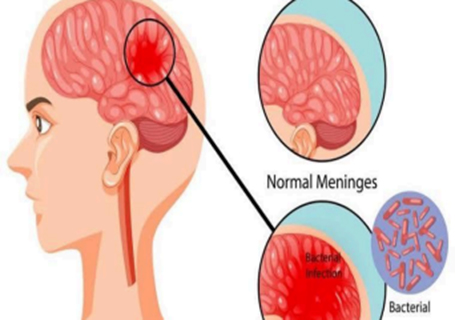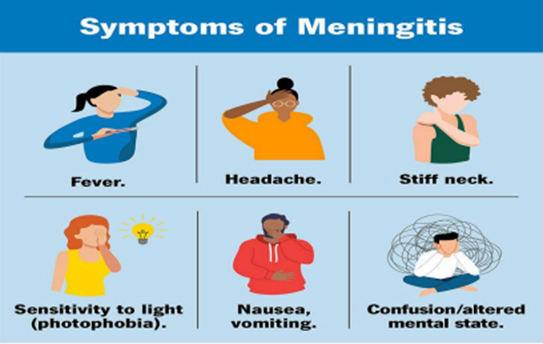Meningitis: A Modern and Ayurvedic Perspective

Meningitis is a serious condition involving inflammation of the
protective membranes covering the brain and spinal cord, known as the meninges.
It can be life-threatening and demands immediate medical attention. While
modern medicine focuses on rapid diagnosis and antimicrobial treatment,
Ayurveda offers complementary perspectives aimed at holistic recovery and
long-term immunity.
Modern Medical View of Meningitis
Causes:
Meningitis is primarily caused by:
- Viral infections (most common)
- Bacterial infections (more severe and potentially fatal)
- Fungal infections (rare, often in immunocompromised individuals)
- Non-infectious causes (autoimmune diseases, medications, cancers)
Symptoms:
- Sudden high fever
- Severe headache
- Stiff neck
- Nausea or vomiting
- Sensitivity to light
- Confusion or difficulty concentrating
- Seizures (in some cases)
- Skin rash (especially in meningococcal meningitis)
Diagnosis:
- Lumbar puncture (spinal tap) to analyse cerebrospinal fluid (CSF)
- Blood cultures
- Imaging (CT/MRI)
- PCR or antigen testing for specific pathogens
Treatment:
- Bacterial Meningitis: Requires urgent intravenous antibiotics and
corticosteroids.
- Viral Meningitis: Mostly self-limiting; supportive care with fluids,
rest, and antiviral medication if needed.
- Preventive Vaccines: Hib, pneumococcal, and meningococcal vaccines
are highly effective.
Ayurvedic Understanding of Meningitis
In Ayurveda, meningitis does not have a direct equivalent term, but the
symptoms align with conditions under the umbrella of “Sannipata Jwara” (a
severe fever due to imbalance of all three doshas) and “Mastishka Roga” (brain
disorders).
Possible Causes (Nidana):
- Ama (toxins) accumulation due to poor digestion
- Suppressed natural urges
- Invasion of external pathogens (Agantuka Roga)
- Imbalance of Vata (nerve function), Pitta (inflammation), and Kapha
(fluid retention)
Dosha Involvement:
- Vata: Neurological symptoms like seizures, stiffness
- Pitta: High fever, inflammation
- Kapha: Mucus build up, heaviness in the head

- Jwara (fever)
- Shirashoola (headache)
- Arochaka (loss of
appetite)
- Moha (confusion)
- Brahma (dizziness)
- Murchha (fainting or
coma in extreme cases)
Integrated Management Approach
- Emergency care is
non-negotiable in suspected bacterial meningitis.
- Follow-up care to
manage complications such as hearing loss or cognitive decline.
Ayurvedic Supportive Therapy (Under guidance only):
- Deepana & Pachana: To improve digestion and remove ama
- Medhya Rasayana (brain tonics)
- Nasya (nasal administration)
- Panchakarma (detox)
- Diet & Lifestyle: Rest and mental calmness, Avoidance of
excessive screen time, loud noises, and mental strain
Prevention Tips (Modern + Ayurvedic Wisdom)
Modern:
- Vaccination
- Prompt treatment of ear or sinus infections
- Avoid close contact during outbreaks
Ayurveda:
- Strengthen Ojas (vital
immunity) through Rasayana herbs
- Seasonal detox and
rejuvenation
- Practice Dinacharya
(daily routine) and Ritucharya (seasonal regimen)
Conclusion
Meningitis, though acute and potentially life-threatening, can be managed effectively with prompt medical care. Ayurveda does not replace emergency treatment, but its approach to restoring balance, detoxifying the system, and strengthening the brain and immunity can be valuable in recovery and prevention.
Dr. Sifana (B.A.M.S)
Medical Officer
Dr. P. Alikutty's Ayurveda and Modern Hospital - Kottakkal
 en
en
 العربية
العربية









